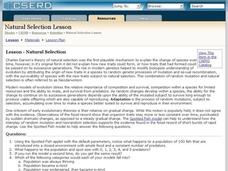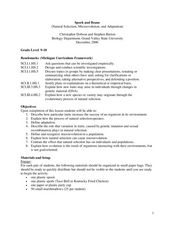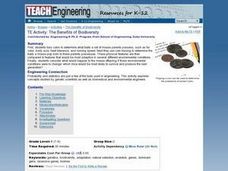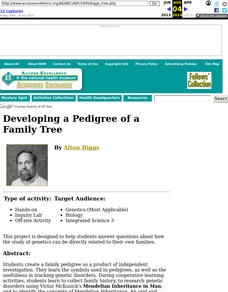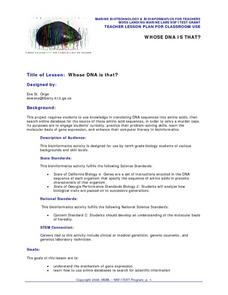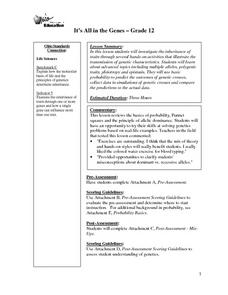Howard Hughes Medical Institute
Biochemistry and Cell Signaling Pathway of the Mc1r Gene
How do mice have so much fur color variation over generations? Scholars illustrate protein structures based on amino acid sequences. Then, they analyze the signaling pathway in different-colored mice populations. This allows them to...
Howard Hughes Medical Institute
Color Variation Over Time in Rock Pocket Mouse Populations
While many mutations are neutral, those that appear advantageous increase in frequency in a population. Scholars use illustrations to make predictions about populations of mice. They follow it up with a video to confirm or refute their...
Oregon Museum of Science and Industry (OMSI)
DNA Extraction
What does your DNA actually look like? Use simple materials with this experiment to find out! Geneticists of all ages can follow these instructions to extract their own DNA. For learners who are hoping to extend the activity, there are...
Curated OER
Natural Selection: Exploring the 'Ohi'a Common Garden
Seventh graders examine natural variation by visiting the Ohi'a Common Garden in Volcano, Hawaii. In this natural selection lesson, 7th graders study background information about phenotypes, genotypes, and phenotypic plasticity before...
Curated OER
DNA
Students explore the basics of DNA and its history. In this DNA lesson plan students extract DNA from fruits and understand how it is used in forensics.
Curated OER
Artificial selection
Students brainstorm a list of improvements they might make to a picture of a skinny cow to improve its milk yield. They draw ideas on the board and compare these pictures with the original and ask the students which cow they would use...
Agriculture in the Classroom
A Rafter of Turkeys
How did that turkey get from the early Aztec culture to your table? Learn about the history of wild and domesticated turkeys in North America, as well as their inclusion in Thanksgiving traditions, with a two-part agricultural science...
Howard Hughes Medical Institute
Natural Selection and the Evolution of Darwin's Finches
Darwin explained the connection between species of finches 150 years before scientists understood DNA. Technology and progressing science proved he was right, yet many struggle to understand how natural selection happens. Scholars use...
Curated OER
Biology: Natural Selection
Young scholars explore evolutionary processes and theories using the spotted fish applet. They observe what happens to fish in a closed environment with both food and predators. Students run the model several times and answer questions...
Curated OER
Here's Looking at You
Students assess some common inherited traits which are easily observable and note their phenotype for the trait. Students compare their phenotypes to those of their parents and attempt to describe the pattern and manor of inheritance.
Curated OER
Ladders of Life
Students explore the field of genetics. They examine four basic traits. Students demonstrate their knowledge of phenotype and genotype by charting their personal traits. Students compelte a Meiosis chart. From the chart results,...
Curated OER
From Genomes of Species
Pupils investigate genomic research being done and its potential for understanding, treating, and possibly curing human genetic conditions. The potential of proteomic research as a companion to the work being done with genomics is...
Curated OER
Gene Puzzles
Students come to understand that in sexually reproducing organisms, such as humans, typically half of the genes come from each parent.
Students examine a fictional pedigree and determine which gene is responsible for a given trait. The...
Curated OER
Spork and Beans
Students examine natural selection, how it works and how it can cause microevolution. In this evolution lesson plan students complete a lab activity that shows the effects that natural selection has on organisms.
Curated OER
They're more evolved that way
Students explore the notion of local evolution, or genetic selectivity among different continent-based human populations. They consider specific examples of local evolution, such as lactose tolerance, skin color, and cognitive capacity,...
Curated OER
The Benefits of Biodiversity
Students examine the concept of biodiversity. They toss coins to determine what traits mouse parents have and the babies traits as well. They predict what would happen to the baby mice if the traits of the parents were different.
Curated OER
Cells: Nature's Building Blocks
What you will find on this page is the general outline of a unit on the use of a microscope and the structure of the cell. There is no actual educational content here, so you will need to design the details of each of the four student...
Curated OER
Developing a Pedigree of a Family Tree
Students create a family pedigree as a product of independent investigation. They learn the symbols used in pedigrees, as well as the usefulness in tracking genetic disorders. During cooperative learning activities, students learn to...
Curated OER
Cell Reproduction and Inheritance
Students determine their inherited characteristics from their parents. In this biology lesson, students study the life of Mendel using an interactive website. They differentiate dominant and recessive characteristics.
Curated OER
English Exercises: Open Cloze: Why Dogs Bark
In this language arts worksheet, students complete an online interactive exercise in which missing words are filled in to make a text complete. Students read the text about why dogs bark and fill in a word of their choosing in each of...
Curated OER
Whose DNA Is That?
Learners investigate the use of technology in order to identify different sequences of amino acids by using online web tools. They enhance problem solving skills with amino acid identification skills and strengthening comfort with using...
Curated OER
How to Conquer a Genetic Disease
Students study the details of DNA restriction analysis and how RFLP's are used to locate genes on a map of DNA.
Curated OER
Mendellian Genetics
Young scholars describe the inheritance patterns other than simple dominance. They are taught how Mendel's principles apply to all organisms. Students review the use of Punnett Squares. They are taught the principles of probability...
Curated OER
It's All in the Genes
Twelfth graders investigate the inheritance of traits through several hands-on activities that illustrate the transmission of genetic characteristics. Students study advanced topics including multiple alleles, polygenic traits,...








